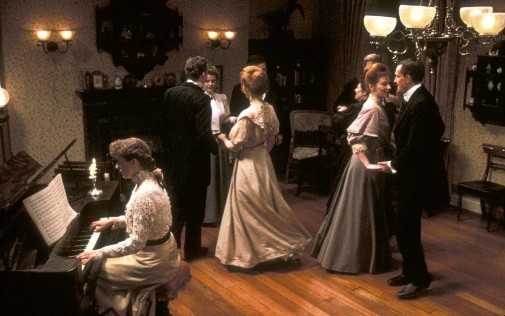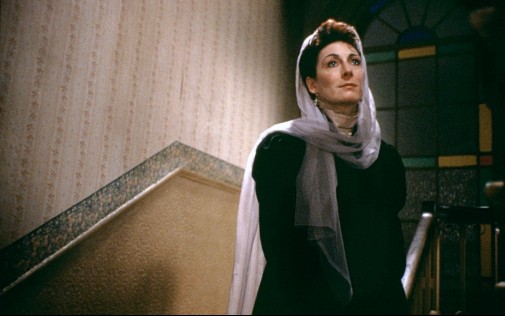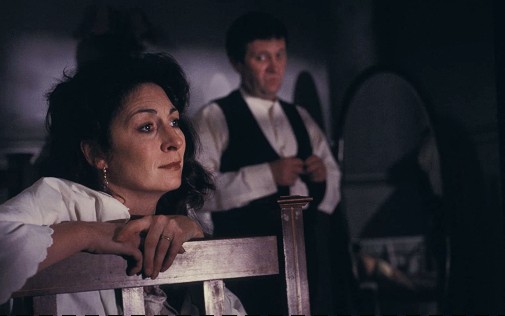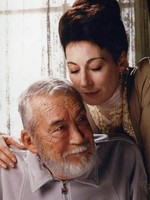"The Dead" and the end of John Huston
 Thursday, November 19, 2020 at 11:00AM
Thursday, November 19, 2020 at 11:00AM Few cineastes can count their last film among their greatest works. Fewer still finish a career, a life, with their best cinematic effort. As much as I admire such gems as Ophüls' carnivalesque Lola Montès, the amorous musings of Dreyer's Gertrud, the bittersweet self-reflections of Akerman's No Home Movie and Varda's Varda by Agnès, I wouldn't classify any of those pictures as their director's crown jewels. John Huston's a whole different matter.
The American filmmaker, whose career spanned six decades, finished his last picture in 1987. Faithfully adapted from a short story by James Joyce, The Dead may not be as influential as The Maltese Falcon, as exciting as The Treasure of the Sierra Madre, nor as tragic as The Misfits, but, as far as I'm concerned, it's Huston's most ravishing creation…

The Dead was a passion project for John Huston. He was dying through most of its making and knew it too, as did his children. Son Tony Huston wrote the screenplay for the flick and worked as an assistant director, aiding the patriarch who was succumbing to emphysema and cardiac issues. Anjelica Huston, who had won her Oscar for John's previous picture, Prizzi's Honor, was also on set, playing the role of Gretta Conroy and delivering her most luminous performance.
Set in a snowy night of December 1904, The Dead is a shockingly simple affair, devoid of outward conflict or any hint of bombast. Its humble story concerns a holiday party being thrown by the elderly Morkan sisters and their devoted niece, all of whom have dedicated their lives to the performance of music as well as its teaching. Among the guests are family and professional acquaintances, longtime friends, and newfound companions who partake in an evening of shared joy and sauce-less roast goose.
The action nearly unfolds in real-time, only using the abbreviating power of cinema editing once or twice. Through the evening, our eyes and ears are drawn to different people, basking in the warm glow of their humanity. From the charm of a drunken guest to the poetic recitations of a splendid orator, there's much to admire about this congregation and Huston is generous towards them all.

Many moments of the party draw a tear or two from my eyes, but I'd like to highlight one particular scene of serene transcendence.
As a former choir singer's aged voice bellows a tune by Bellini, the image floats through the house, abandoning the Dubliners and finding the objects that materialize ghosts of their past. Pictures on the wall, yellowed embroidery framed like relics, winter coats resting on a crochet bedcover, trinkets of long lives nearing its end. It's beautiful, melancholia summarized in the glide of the movie camera and soft fades. Elegiac and modest, all the more powerful for how simple it is.
A tinge of sadness shades the merriment, but there's also happiness blossoming from the sorrow. The ephemerous nature of life is subtly expressed in Huston's observations, but his conclusions aren't steeped in misery. Our existence might have an end, but it's beautiful while it lasts. Whether long and rich or short and despondent, human life is to be treasured. The same is true of the imagination and the emotion of the mind and the heart. In the end, all of these are things so wondrous they're beyond comprehension. So fragile too.

When the night reaches its end, and the Conroys are leaving to go back to their hotel room, Anjelica Huston's Greta is stopped on her way down the stairs. A song laced with painful memory comes floating down from above and, for the duration of the melody, no one moves. Quietness rules over the scene, and the actors' faces dominate the frame. A single tear shines with all the deep meaning contained in Joyce's prose. For a moment, it's as if the world stands still, on and off-screen.
The Dead reaches its ending at the Conroys' room when Gretta explains her reaction to the music. I won't spoil the sad tale she tells but be assured it's as beautiful as anything that's ever been recorded on celluloid. Our eyes become Greta's husband's eyes as he sees her, perhaps for the first time. Illuminated by moonglow, the actress' face is a monument, a blessing, a miracle. Both Hustons, in front and behind the camera, handle the scene with delicateness, as if its spell could be broken with a misplaced whisper.

Many would call The Dead too small to be worthy of this praise, but there's spellbinding rigor to its construction. A lifetime of experience informs the director's every choice, his audiovisual language perfected to the point of poetic minimalism. As gentle as a kiss from a snowflake, as warm as a holiday meal, as inebriating as strong port, The Dead is a perfect film, the kind which makes one believe that there might indeed be some otherworldly magic to this seventh art.
 1987,
1987,  Anjelica Huston,
Anjelica Huston,  John Huston,
John Huston,  The Dead
The Dead 



Reader Comments (13)
Thank you for this, captures what this film is doing beautifully. I saw this in a small, decaying independent theater when it was released and I remember sitting there after it was over for a few minutes just taking it in and crying. Says so much about what we value in our lives as well as the ephemeral nature of it all.
Lovely writing, as always, about a lovely film. It really could be one of those annual films that we watch every year in early January. It seems a natural for a stacked Blu-ray edition with Joyce scholars and Huston experts and Angelica and Tony Huston interviews. I never bought the DVD because when it first came out it was missing five or ten minutes due to a duplication error or something. I think they fixed it, but I never quite trusted that I'd get a good copy.
It’s such a gorgeous, delicate film, and I love everything you wrote about it. Of all the stuff that I discovered for 1987 it’s easily my favorite, for all the melancholy and celebration you describe. Anjelica’s a dream, and I’m just as awed by Donal McCann. I’m torn between watching it again this December and preserving my first viewing as the only one - watching something this ephemeral again almost feels strange.
Nicely written piece I think Anjelica is at her very best in this and that's saying a lot.
Speaking of last great films, what about Robert Altman's A Prairie Home Companion and Andrei Tarkovsky's The Sacrifice?
Its a very good film and fitting end to an extraordinary career
Quite like this, and Anjelica is sooo good in it.
The entire final sequence in the bedroom, but especially Donal McCann's aria, which, yes, is all Joyce's doing...
But this has to be one of the clearest examples of spellbinding ever made by man.
And as firm a proof of the power of music as any.
If every director could end their careers on such an incredible grace note, man, if only...
I didn't love it the first time I saw it, probably because I was too young, but I read the story and then rewatched it not long ago and BOOM. Stays with your forever.
Hmmm, I think you missed a couple notable filmmakers whose swan song many agree was their pinnacle:
Bresson, L'ARGENT
Sirk, IMITATION OF LIFE
greydog -- Thank you for your kind words. I did get teary-eyed a lot throughout this re-watch.
Nick Taylor -- I'm glad you enjoyed this piece and the film too. Donal McCann is nomination-worthy too, as is the wonderful Helena Carroll.
markgordonuk -- I love a lot of her performances, but this is probably my favorite.
thevoid99 & Jonathan -- The first paragraph of this piece was, by no means, a comprehensive list of great last films. I appreciate all of the examples you mention, but, personally, I wouldn't consider any of those films to be their director's best. I thought, for instance, of mentioning Elem Klimov and Larisa Shepitko, but I try (and usually fail) to aim for succinctness. Also, do people really think L'ARGENT is Bresson's best film. I have three books about him and, while they're very positive about his last film, none of them really point it out as the peak of his filmography. Personally, I prefer most of his 50s and 60s output.
Peggy Sue -- I've loved it since the first time I watched it. Though, watching it after having read THE DUBLINERS is a different experience.
Thank you all for the feedback. I'm glad other people are fans of this wonderful picture.
Yeah. The Dead is one of the great glories of English language literature and this movie does it justice.
It was such a risk on Huston's part to make an adaptation of Joyce's beautiful, sparsely-written, elegiac gem. I loved the story long before the film was made and wondered, on going to see it for the first time, whether it would be ruinous. To the contrary, it went straight into my top ten films and has remained there as others have jostled for a place over the years. I've seen it five times now and, although intermittently teary-eyed throughout, I simply cannot get through that final scene without tears pouring down my face.
The casting is perfect and the acting and directing so unemphatic that the layers of resonance, the truth of the characters, are allowed to breath. Space is given to the overarching awareness of transcience, joy, sorrow, love and loss. But nothing is forced.
The diegetic song which constellates Angelica Huston's trance-like moment of recall is such an extraordinary moment. It's as though the whole world has stopped turning to listen.
Thanks for such a great review of a dearly-loved film. If anyone hasn't seen it, make good the lacuna.